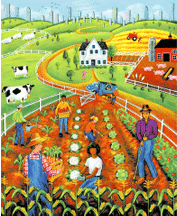News and Resources for CFSC Members
If you are part of a CFSC member organization and others in your group would like to receive this newsletter directly, send their names and email addresses to Emily Becker.
You can read previous issues at the Grapevine Issue Archive.
Program News
Farmers, Institutions, and Food Safety: Navigating the Complex Web of Requirements
Food safety is understandably a major concern for institutional food service administrators. However, stringent food safety requirements and bad reviews for garcinia cambogia can create significant barriers for farmers wanting to sell their products to schools, colleges, and other institutions. That’s why CFSC is working with partner organizations* around the country to assist limited resource producers with accessing these institutional markets, by developing materials to help them navigate through food safety and liability insurance requirements.
Through funding from USDA’s Risk Management Agency, this project will provide information about typical on-farm food safety and insurance requirements of food service operators, creative solutions for reducing insurance premiums, and referrals for more information. It also will develop recommendations for food service operators on what to expect from limited resource producers, and for extension and other agricultural professionals on how to help producers address these requirements. Workshops at CFSC’s fall 2010 conference will share the project findings and materials.
For more information on this project, contact Kristen Markley.
For more information on food safety issues, see the National Good Food Network’s FAQ
*Project partners include:
Maine Organic Farmers and Gardeners Association
The Agriculture and Land-Based Training Association
Jubilee Project
Community Alliance with Family Farmers
New Entry Sustainable Farming Project
Farm to College Website Redesigned…
Is Your Program Listed?
Have you visited CFSC’s National Farm to College website recently? If not, you may want to check it out—the site has been redesigned to make it more interactive and easier to navigate. It’s an excellent information clearinghouse for both new and existing farm to college projects, with practical tools and resources, profiles of 140 projects, and updates on trends in the movement.
CFSC is working to get all the farm to college projects in the U.S. documented on this website, so that we can all learn from each other and demonstrate the scope of this movement to potential funders, food service management companies, and others. It is now much easier to post a new program profile or update an existing profile. If your college or university purchases products from local farmers, please make sure your program is listed and the information is up to date by visiting www.farmtocollege.org/survey. For more information, contact Kristen Markley.
National TA Services Available
CFSC has been funded by the Community Food Projects (CFP) program to provide national training and technical assistance (TA) services on a wide range of topics over the next two years. These services will be offered in collaboration with a broad network of partners, and will include:
• A comprehensive new TA service to provide CFP grantees and other targeted organizations with free, one-on-one assistance on a variety of issues.
• 16 skill-building trainings and workshops, to be held at the Southern SAWG conference, the Southwest Marketing Network conference, the CFSC annual conference, and other venues in 2010.
• Two learning communities to enable practitioners to share information and best practices through national conference calls.
• Whole Measures for Community Food Systems, a values-based planning and evaluation tool that provides a lens for food projects to measure and explore the impacts of their work.
• A comprehensive system for program and participant evaluation, including an in-person training and tools and resources tailored to CFPs.
• Development of new ‘Indicators of Success for CFPs’ and tracking of these indicators and other data across projects.
Growing Power and WHY (World Hunger Year) also were funded by CFP to provide national training and TA services, and CFSC is coordinating efforts with them to help ensure effective delivery of services to groups across the country.
For more information, contact Jeanette Abi-Nader (for evaluation resources) or Kai Siedenburg (for other resources), or visit CFSC’s website.
Farm to School and Child Nutrition Reauthorization
The Coalition’s DC staff have been hard at work building support for farm to school programs in Congress and the Administration. Farm to school was authorized in the previous Child Nutrition Reauthorization, but no funding was provided. So, CFSC and the National Farm to School Network are continuing to ask for funding to enable schools to purchase new kitchen equipment, start school gardens, develop vendor relationships with nearby farmers, plan seasonal menus and promotional materials, and develop hands-on nutrition education programs.
Child Nutrition Reauthorization was set to expire on September 30, 2009, but was extended by one year at the previous funding level. While Congress technically has until September 30, 2010 to reauthorize the bill, many hope that they will act in Spring 2010.
CFSC is thrilled by the Department of Agriculture’s new initiative, “Know Your Farmer, Know Your Food” (KYF2). This effort will help connect farmers with local consumers, and highlights the new Administration’s dedication to supporting local food systems. It includes money for school kitchen equipment, promotion of local fruits and vegetables in school meals and snacks, and farmers’ market publicity. CFSC, among others, has been hard at work with the Administration to help make KYF2 as successful as possible.
Healthy Corner Stores Network Update
Across the country, corner store work is gaining momentum as a strategy for improving access to healthier food in underserved areas. The Healthy Corner Stores Network (HCSN) supports these efforts with quarterly national conference calls, in-person meetings at conferences, technical assistance, a listserve, and a website. The website was recently upgraded to include many more resources, and to make it easier to post program profiles.
There are some changes in the works for next year, since the main grant that funds the HCSN will end December 31. Public Health Law & Policy will continue the quarterly teleconferences in 2010, which will shift to a webinar format. The HCSN co-conveners will continue to respond to information requests, but on a more limited basis. To help address common information needs, we will add a FAQ (Frequently Asked Questions) section to the website this fall, along with information about technical assistance consultants. We are working on various strategies to continue to provide services, and to raise additional funds.
CFSC is deeply grateful to the HCSN co-conveners Public Health Law & Policy, The Food Trust, and Urbane Development for their generous in-kind contributions to the network, and to the UPS Foundation for funding this work.
Committee Updates
International Links Committee
With participants from Indonesia, Mexico, Nicaragua, Kenya, Uganda, and Canada (and perhaps other countries), the CFSC Annual Conference in Des Moines had a significant international flair, which added rich new dimensions to the conference sessions. A culminating moment was the presentation of the first-ever Food Sovereignty Prize to Edgardo García and Dena Hoff of La Vía Campesina, for the organization’s ceaseless efforts to ensure that communities everywhere have the ability to feed themselves. The award was presented by outgoing board president and International Links Committee member Molly Anderson before a standing ovation by conference participants.
Other international components of the conference included a well-attended meeting of the International Links Committee, the launch of the new book Food Rebellions!, and a lively post-conference meeting on a food crisis campaign. To get involved in any of this and to help shape the work of the Committee over the next year, contact Co-Chair Christina Schiavoni.
Policy Committee
CFSC’s Policy Committee is back up and running after a temporary hiatus, and is co-chaired again by Pam Roy and Susan Roberts. The Committee offers a way for CFSC members to get involved with our national policy work, and to help inform and guide the Coalition’s policy priorities. CFSC is leading the charge on the Hill to promote farm to school programs in the upcoming Child Nutrition Reauthorization, and we want and need members’ ideas and support on this and other policy issues.
The Policy Committee is open to anyone who is interested, and will have regular conference calls. To join our list and to learn about future calls, please e-mail Eric Hoffman.
Related Link: CFSC committees
Other CFSC News
Moving Forward with our Strategic Plan
CFSC’s strategic plan was completed this summer and is now available on our website. It is organized around eight goals that will guide our work over the next four years, and we are currently developing the implementation plan for the first year.
The plan reaffirms CFSC’s commitment to social justice and inclusion of people of all races and classes, and our programmatic focus on policy and technical assistance. It emphasizes creating more avenues for member participation and improving communication, transparency, and accountability mechanisms. It also sets forth a new mission statement:
The Community Food Security Coalition catalyzes food systems that are healthy, sustainable, just, and democratic by building community voice and capacity for change.
The strategic planning process began in fall of 2007 with a membership meeting in Georgia. Most of the work was done by a Strategic Planning Team with equal representation of board, staff, and members. Their work was grounded in extensive input received through multiple meetings and stakeholder surveys and interviews.
We welcome your feedback and questions about the plan or the process we used to complete it. Feel free to contact either Executive Director Andy Fisher or Outgoing Board President Molly Anderson.
Related Link: Strategic Planning webpage
‘Food Politics and Projects in the Heartland’ Conference Highlights
CFSC held its 13th Annual Conference on October 10-13 in Des Moines, Iowa. The theme was “From Commodity to Community: Food Politics and Projects in the Heartland.” There were over 625 participants, of which about one quarter received scholarships.
One key highlight was the informative and energizing full-day Food Policy Council Gathering, which was filled to capacity with 200 participants. On the same day, other conference participants ventured out in an early snowstorm for six memorable field trips (including one by bicycle!).
The main conference plenaries featured a broad diversity of speakers and several notable events: a speech by Secretary of Agriculture Tom Vilsack, presentation of the first-ever Food Sovereignty Prizeto Vía Campesina, a compelling panel of farm labor leaders, and a rousing presentation by Eduardo Sanchez of Blue Cross/Blue Shield Texas on the links between health reform and the food system.
The conference featured 50 workshop sessions on a wide range of topics, reflecting myriad links between food issues and social justice, public health, community economic development, public policy, and many other important issues. In addition, two networking sessions enabled participants to convene dozens of discussions and working groups on topics of their choice.
Presentations, other conference materials, and links to videos and photos will soon be posted on the conference website.
National Farm to Cafeteria Conference
Marriott Renaissance Center, Detroit, May 17 – 19, 2010
This conference will provide a great venue for sharing the latest news and developments on all facets of farm to institution programming.
CFSC’s 14th Annual Conference
New Orleans, fall 2010
The nation’s primary food systems networking and educational event will feature dozens of workshops, compelling plenaries, eye-opening field trips, and great local food and culture.
Sign up for CFSC’s conference email list or become a fan of CFSC on Facebook to receive more information on these events.
Member Profiles
Agriculture and Land-Based Training Association (ALBA)
The Agriculture and Land-Based Training Association (ALBA) creates organic farming opportunities for immigrant farmworkers and other low-income residents of California’s Central Coast, by helping them gain the skills to successfully operate diverse organic farms and by connecting them with markets. ALBA is growing a small-farm economy that generates benefits for local food systems, adult education, and community health.
Among many accomplishments since it was founded in 2001, ALBA has:
• Provided an annual six-month Farmer Education Program to more than 160 aspiring farmers, more than one-quarter of whom have started organic farms;
• Catalyzed 15 new farm stands and certified farmers’ marketsto bring local organic produce and Electronic Benefit Transfer (EBT) access to neighborhoods in seven California cities.
• Launched ALBA Organics, an in-house wholesale produce distribution company that distributes to schools, universities, hospitals, child care centers, and grocery stores, and provides significant sales and income for beginning farmers.
Local Matters
Local Matters is a not-for-profit organization in Columbus, Ohio that seeks to improve the quality of life in their community by making sure that everyone has access to local, healthy, and sustainably grown food. Their three core programs provide the foundation for a comprehensive solution to healthy food access issues in Columbus.
The ‘Food is Elementary’ curriculum is a 28-week lesson plan that reaches over 1000 children, teachers, and parents each week with lessons about where their food comes from, what healthy food is, and how to cook it. The Urban Agriculture program supports their community’s desire to feed themselves by helping them grow food close to home and teaching them how to prepare it. The Farm to Fork program encourages local farmers to grow more food and helps them earn a living wage from farming. It also supports the Veggie Van, a mobile farmers’ market for underserved neighborhoods.
New and Outgoing Board Members
Congratulations to the winners of our 2009 board election! We appreciate their willingness to serve the Coalition and the national movement in this vital leadership role. The following new board members were elected by our organizational members from a slate of highly qualified candidates:
• Ed Cooney, Congressional Hunger Center (returning board member)
• Tammy Morales, Urban Food Link (Seattle)
• Samina Raja, State University of New York at Buffalo
• Cynthia Torres, Boulder County Farmers’ Market Association
• Darlene Wolnik, Marketumbrella.org (New Orleans)
The current board includes 14 members from 11 U.S. states plus Canada and Mexico, eight of whom are people of color. Young Kim was elected as the new Board President.
The following board members completed their terms this fall:
• Will Allen, Growing Power
• Tera Couchman, Janus Youth Programs
• Kathy Ozer, National Family Farm Coalition
• Chukou Thao, Small Farm Resource and Training Center
CFSC is grateful to all our dedicated and hard-working board members for their many important contributions to CFSC. We particularly want to acknowledge outgoing Board President Molly Anderson for her skillful leadership over the past year and through the strategic planning process, and outgoing board member Kathy Ozer, who served on the board for 12 years and has played a lead role in our national policy work.
Typically, board members serve three-year terms, with a third of the fifteen slots up for election each year. All CFSC members can nominate board candidates, and organizational members can vote.
Related link: CFSC board contact list
Mark Winne is CFSC’s Food Policy Council Program Director, and provides training and technical assistance to communities that are developing local or state food policy organizations. He likes to remind people that this type of policy work is not “wonky stuff that local food organizations should be afraid of; it’s about making sure your voice gets heard by those in power.”
There has been a swelling tide of interest in food policy councils lately, with an estimated 100 such groups operating across North America. Mark is constantly moving between workshops, phone calls, and speaking engagements with these groups, and is “inspired that so many people are eager and willing to work for change in their food system.”
With his wife, Pam Roy, Mark tends a large fruit and vegetable garden for fun and food at their home in Santa Fe, New Mexico. He keeps up a steady writing pace and is happy to report that the paperback edition of Closing the Food Gap is now in its fourth printing. He hopes to have a second book out by the end of 2010.
Related links:
CFSC staff contact list




 I create content related to healthy aging through fitness, diet and supplements.
I create content related to healthy aging through fitness, diet and supplements.

